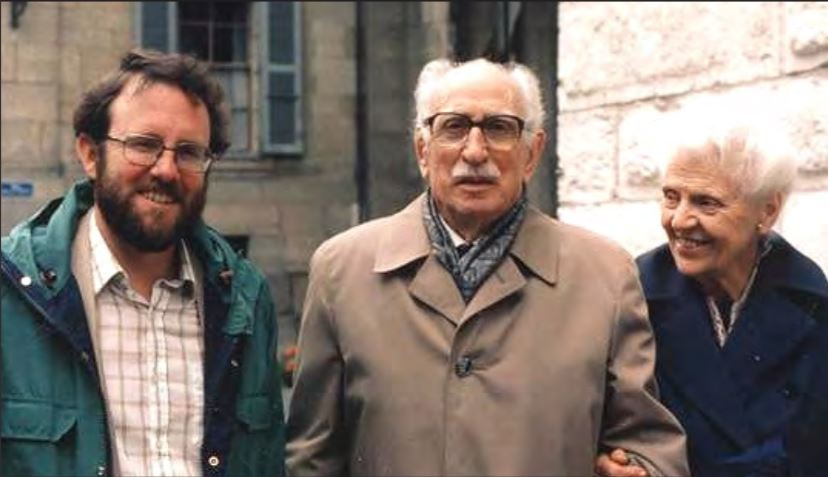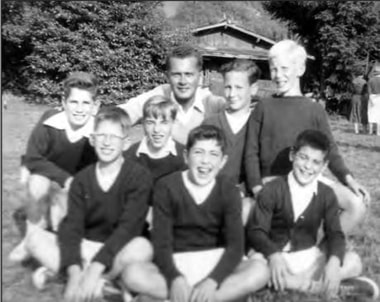
|
Who knew, back in 2009, what a difference the MacJannet Prize would make? By Tony Cook Just 12 years after its birth, the MacJannet Prize for Global Citizenship is an astonishing success story. Its influence has far surpassed the modest dreams of its creators (myself among them). It’s become a driving force behind the global Talloires Network of Engaged Universities, which is itself the driving force behind a revolutionary idea currently sweeping the academic world: that universities should venture beyond their cloistered towers to grapple hands-on with real-world issues. In these 12 years, more than 525 civic engagement programs on six continents have applied for the Prize, and 64 of them— in 26 countries around the world— have been honored as Prize-winners or honorable mentions. “The MacJannet Prize is our longest running program,” says Dr. Lorlene Hoyt, executive director of the Talloires Network. “It is well-known and highly regarded by higher education institutions and communities around the world.” The Prize has set the standard for what can be accomplished when students and faculty harness their skills to improve the lives of their fellow citizens. And often, the first question uttered by Prize recipients is: “Who were the MacJannets anyway? And why is there a prize named for them?” For the answer, you must journey back more than a century to Paris in 1920, when a charismatic expatriate American, Donald MacJannet, began tutoring children of American diplomats, soldiers, and business executives stationed in Europe in the wake of World War I. Within three years Donald had assembled enough charges to create a school. One of his early students was my father, Howard Cook, who attended what was then called The Elms, after the mansion the school occupied on the outskirts of Paris. When the resourceful and inspirational “Mr. Mac” subsequently launched the MacJannet Camps on the shores of Lake Annecy in 1925, young Howard followed him in 1927 for two summers. Twenty-seven years later, I myself savored a summer season at the MacJannet Camps (one for boys, one for girls) and encountered Donald and his German-born wife Charlotte. They made quite a team: Donald exuded boyish enthusiasm and a love of learning; Charlotte, for her part, conveyed artistry and discipline. Together with a staff of counselors from around the world, these two educational radicals demonstrated how activities like mountain climbing, visiting cultural landmarks, and playing games could be utilized to impart curiosity, creativity, and courage to the young people in their care. But in retrospect, the MacJannets were much more than educators. They were what we would now call “social entrepreneurs.” Ultimately, they created a farflung community of school and camp alumni who, having experienced the excitement of “learning by doing” abroad, became ambassadors of international understanding. A novel concept Eventually, the Macs and their followers created the non-profit MacJannet Foundation in 1968 to perpetuate the values that had defined their lives. (One of those followers, my father Howard Cook, served as the Foundation’s president from 1986 to 1996, and I assumed the same role from 2008 to 2013.) This incubator produced the seeds of cultural exchange programs, graduate courses in international affairs, and ultimately the MacJannets’ gift of “Le Prieuré,” the unique 11th Century priory in Talloires, France, that they restored in the 1960s and donated to Donald’s alma mater, Tufts University, in 1978. The Prieuré subsequently became the locus of an ambitious MacJannet-style study-abroad program for Tufts undergraduates as well as the gathering spot for educational conferences. At one such meeting in 2005, assembled there by Tufts’ then-president Lawrence Bacow, 29 university presidents and chancellors from 23 countries pledged their support for a then-novel concept called “civic engagement.” Traditionally, students studied in classrooms and laboratories before venturing out into the world to apply their knowledge. By contrast, the founders of what became the Talloires Network of Engaged Universities envisioned medical students pursuing public health projects, engineering students applying their development skills, and liberal arts students attacking real-world illiteracy. Without realizing it, in effect they embraced the philosophy of “learning by doing” that the MacJannets had been practicing since the 1920s. As it happened, the first executive director of the new Talloires Network was Dr. Robert Hollister, the dean of what was then called Tufts’ Tisch School of Citizenship and Public Affairs. “Rob” Hollister had also been a MacJannet camper in the 1950s– one who was named “Best All-Around Camper” two years in a row. Another camp alumnus was fellow MacJannet Foundation board member George Halsey, who had been my canoeing buddy in Talloires in 1954 when we were 12 years old. The three of us wanted to find a way to memorialize the MacJannets, who had helped shape our individual character and intellectual development. As we saw it, Donald and Charlotte epitomized the very same kind of commitment to improve the world that the Talloires Network’s universities sought to cultivate. A modest proposal For his part, Dr. Hollister imagined that a prize awarded to exemplary programs fostered by Talloires Network institutions would inspire others and benchmark those accomplishments for fellow members. As then-president of the MacJannet Foundation, I felt that a prize honoring the legacy of our founders would perpetuate their contributions to increased international understanding while simultaneously expanding our nascent virtual community of global citizens. When we proposed a partnership between the MacJannet Foundation and the Talloires Network to create the Prize, we didn’t anticipate the Network’s enthusiastic reception. Thanks to an inaugural gift from our oldest Foundation trustee, Cynthia Raymond, the MacJannet Prize program was launched in 2009. But at the time, we had no idea of the galvanizing role the MacJannet Prize would play. At first, the Prize nominees sought recognition for worthwhile but relatively small-scale university programs— building a community garden, say, or offering after-school tutoring for disadvantaged children, or collaborating with prison inmates to mount a theater production behind bars. But the scope of the submissions soon grew more ambitious. For example, Aga Khan University developed community health services to benefit squatter settlements in Karachi, Pakistan. Students at Beirut’s Université Saint-Joseph launched broad efforts to relieve the humanitarian crisis brought on by the brutal 2006 war in Lebanon. Going virtual Today, in the course of jockeying for the MacJannet Prize, many of the competing programs are tackling some of the world’s most pressing problems: breaking down social barriers, fostering sustainable development, promoting public health, addressing conflict resolution, and confronting climate change. All this for a prize whose top award has never exceeded $7,500, and whose annual cost to the MacJannet Foundation runs no more than $30,000. Even in the face of the 2020 global pandemic, the latest class of MacJannet Prize winners continued their community-building efforts. Ngee Ann Polytechnic in Singapore quickly pivoted to what its organizers called “Service Learning,” which enabled them to pursue 20 projects virtually in response to the public health crisis. These included soliciting donations of soap and other amenities for care packs distributed to migrant workers, and collecting laptops for home-based learning among low-income families. On the other side of the globe, the founders of a community entrepreneurship training program at the University of Zimbabwe in southern Africa coped with a nationwide lockdown by quickly adopting virtual coaching sessions between the program’s undergraduates and their trainees. With the support of the MacJannet Prize, its students began implementing an initiative that helps Micro, Small and Medium Enterprises by providing tailored entrepreneurship training and small revolving loans for struggling business owners. Sharing success stories The MacJannet Prize has evolved into a highly influential tool for universities to publicize their civic engagement programs. (Many Prize winners have garnered extensive coverage in local and national news media.) The winning programs, meanwhile, have provided inspiration and guidance for others. As a side benefit, the MacJannet Prize has become an important tool in recruiting universities to join the Talloires Network so they too can apply for the Prize: In just 15 years, the original nucleus of 29 Talloires Network members has grown to 417 universities and colleges in 79 countries. In 2017, the MacJanneet Foundation’s prize funds were used to enable former winners to gather at the Universidad Veracruzana in Mexico for the Talloires Network’s triennial symposium to exchange useful real-world anecdotes and best practices. In the process, says Professor Hoyt of the Talloires Network, the Prize has generated “a treasure trove of data about university civic engagement programs.” The next symposium will be a virtual gathering in September 2021, co-hosted by Tufts University and Harvard University. This year’s Prizes will be awarded at this celebration of the worldwide civic engagement movement. MacJannet Foundation trustees will participate in marking the milestone. The annual Prize process clearly has also elevated public awareness of who Donald and Charlotte were, what they stood for, and how they lived. Naming the Prize for them, it turns out, has given the award a personal face that has special meaning for the recipients. Clearly, the ripple the MacJannets generated from the shores of their summer camp in the French Alps almost a century ago has swelled into a global wave. Donald and Charlotte are buried in the Prieuré in Talloires; their ashes lie under matching stones on the ground floor, inscribed with Tufts University’s motto: “Pax et Lux” – Latin for “Peace and Light.” It’s inspiring to think that the Prize named for them has spread that same spirit far and wide.
1 Comment
4/14/2022 12:25:59 pm
What an exquisite article! Your post is very helpful right now. Thank you for sharing this informative one.
Reply
Leave a Reply. |
© 2019 MacJannet Foundation. All rights reserved.
MacJannet Foundation
396 Washington Street, Suite 200
Wellesley Hills, MA 02481
MacJannet Foundation
396 Washington Street, Suite 200
Wellesley Hills, MA 02481



